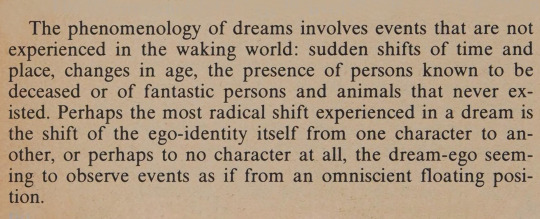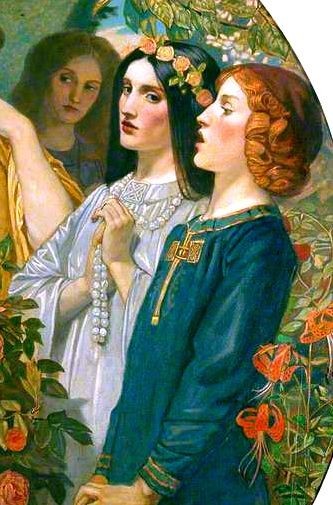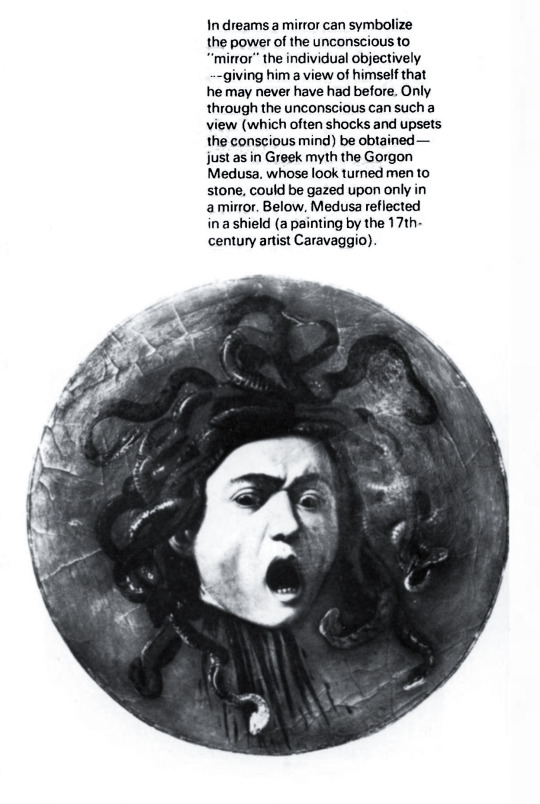#depth psychology
Explore tagged Tumblr posts
Text

Jungian Dream Interpretation: A Handbook of Theory and Practice by James A. Hall First published: January 1, 1983
#carl jung#james a. hall#carl gustav jung#individuation#jungian epistemology#oneiroi#dreams#myths of the soul#archetypes#depth psychology#collective consciousness#shadow work#symbolic language#words#quotes#academia#dark academia#quote#lit#books#books and libraries#literature#jung#reading#quote of the day#bookworm#january 1
234 notes
·
View notes
Text

C.G. Jung, from The Red Book: Liber Novus
Text ID: He whose desire turns away from outer things, reaches the place of the soul. If he does not find the soul, the horror of emptiness will overcome him, and fear will drive him with a whip lashing time and again in a desperate endeavor and a blind desire for the hollow things of the world. He becomes a fool through his endless desire, and forgets the way of his soul, never to find her again. He will run after all things, and will seize hold of them, but he will not find his soul, since he would find her only in himself.
#carl jung#the red book: liber novus#the red book#quote#diary#nonfiction#nonfiction literature#swiss literature#jungian psychology#analytical psychology#depth psychology#psychology#miscellanea#c.g. jung
261 notes
·
View notes
Note
Hi. Not sure if you've answered this before, but do you have a list of books to recommend on fairytale/mythic analysis?
So I finally have a real response to this question, but it's LONG, be warned:
First, it depends what you want to get out of your folklore study, what lens you'd like to use for analysis. And second, it's important to know that the practice of folktale analysis has changed over time, especially in the last ~15 years or so as the scholarly consensus has evolved toward decolonization.
For example, the common historical starting place was Bruno Bettleheim's The Uses of Enchantment. Candidly, I haven't read it yet for a few reasons: 1) It focuses fairly exclusively on Western European fairy tales like those of Grimm, Basile, and Perrault. 2) It assumes the primary audience for such tales are children. 3) It's a white man's perspective, and there are already enough of those to go around. That said, it's considered a foundational text for folklore study, so I'll probably get to it eventually. There are some modern authors who might be considered scholarly successors of Bettleheim, like Maria Tatar. I haven't read her books yet but I know she's also a powerhouse of Western fairy tale analysis.
Some other popular perspectives include the works of Carl Jung and his protégés in psychoanalysis, Marie-Louise von Franz and Erich Neumann. These are wonderful sources for learning about depth psychology and the universal unconscious which causes certain motifs to recur in storytelling across the globe and over centuries. Another popular author in this field is Robert Bly, who dove deeply into the concept of the Shadow as it appears in folk tales.
But for me, my favorite sources have been a collection of feminist authors who were active in the late 80s and early 90s, notably Barbara Fass Leavy and the incomparable Clarissa Pinkola Estes. While their work is pretty firmly grounded in second-wave feminism and therefore not very intersectional as we understand it today, they were the first to begin exploring interpretations of folk tales outside of a patriarchal context. I personally refer to Leavy's In Search of the Swan Maiden and Estes' Women Who Run With the Wolves more than any other books.
A lot of the most current perspectives are only accessible via blogs, like Jeana Jorgensen AKA The Foxy Folklorist, who often explores fairy tales through a Queer lens. Another brilliant voice working today is Helen Nde of Mythological Africans, who is doing the long-overdue work of decolonizing African folklore.
And while all these sources will help you develop a framework for analysis, still one of the best things you can do is read the tales for yourself. One of my favorite series is that of Heidi Anne Heiner of Sur La Lune Fairy Tales, who has amassed impressive collections of folk tales of the same type from around the world, making comparison easy. She also provides excellent footnotes that offer context to the versions and translations she's selected, and every tale has a source.
Outside of that, I like to read regional collections from indigenous scholars and native speakers: some editors will even include a copy in the original language along with the English translation, thus allowing others to "check their work." One of my favorite folkorists like this is Inea Bushnaq, who collects Arab folktales and again provides accessible cultural context. It's important to remember that most oral folktales which are now available in English were first recorded by colonizers, so the versions we have may be edited, mistranslated, or even maliciously altered to suit Western tastes. This is why seeking out versions from actual members of indigenous communities is critical.
Right now, I'm reading The Japanese Psyche: Major Motifs in the Fairy Tales of Japan by Hayao Kawai, and I'm next going to try Oral World and Written Word by Susan Niditch. I tend to just go where the spirit moves me, journal a bit, go down a research rabbit hole about a particular topic... it's fun. But whatever you're looking to get out of your folk tale study, rest assured you will never run out of material!
#folklore#folk tales#fairy tales#mythology#bruno bettleheim#maria tatar#carl jung#marie louise von franz#erich neumann#robert bly#clarissa pinkola estes#barbara fass leavy#jeana jorgensen#foxy folklorist#helen nde#mythological africans#african folklore#inea bushnaq#arab folklore#japanese folklore#depth psychology#comparative mythology#jungian shadow#jungian psychology#sur la lune fairy tales#heidi anne heiner#brothers grimm#charles perrault#giambattista basile#asks
32 notes
·
View notes
Text
People will do anything,
No matter how absurd,
To avoid facing their own souls
- Carl Jung
#psychology quotes#shadow work quotes#philosophy quotes#quotes of wisdom#jungian psychology#escapism#philosophy#psychology#depth psychology#jungian shadow#shadow self#shadow work#jungian#carl jung#occultism#occult#quotes#spirituality#spiritual#quotes to live by
28 notes
·
View notes
Text
As little as we would accuse Christ of fraternizing with evil, so little should we reproach ourselves, that to love the sinner, who is oneself is to make a pact with the devil.
- C. G. Jung, Psychology and Alchemy
#psychology#quotes#carl jung#jungian psychology#jungian archetypes#jung#healing#quote#jungian shadow#mental health#spiritual healing#spiritual awakening#spirituality#spiritual journey#depth psychology
20 notes
·
View notes
Text

Erich Neumann - Depth Psychology and a New Ethic - Harper Torchbooks - 1973 (cover deisgn by Russ Patrick)
#witches#psychologists#occult#vintage#depth psychology and a new ethic#psychology#depth#depth psychology#new ethic#harper books#harper torchbooks#1973#russ patrick
24 notes
·
View notes
Text


Hymn to the Rose by John Duncan, 1907.
But why is this beautiful company worshipping the Rose? The Rose (exquisite and fragrant as actuality but also symbolic) has been associated with many female deities through history. From the followers of the Egyptian goddess Isis to those of the Greek Aphrodite, the Rose became eventually identified with holy Mary and her higher spiritual essence. To follow the Rose, a mystical calling, is to believe in a psychological and spiritual development transcending earthly bounds, to allow an inner unfolding that makes one complete, a unique individual yet in connection with the whole.
#john duncan#mysticism#art#symbolism#spirituality#rose#esoterica#depth psychology#divine feminine#mother mary#goddess isis#aphrodite#mythology#oneness
93 notes
·
View notes
Text

#books#education#depth psychology#blackwomen#blackpsychology#study#books and reading#black excellence#black education#blackperspective#black empowerment#thesagittarianmind
21 notes
·
View notes
Text
Really not a fan of the "we trigger you and pretend as if you are refusing to cooperate and you have 0 progress in the past 5 weeks, this is a waste of time" kind of therapy approach.... I know they do that intentionally to shake you awake and highlight your soft spots or old wounds. But it does feel shit af. And I am never 100% sure if they maybe actually mean it for real.
They suggested today that I have to talk to my father about all the stuff I hide from him. Which is: failed uni in the last bit, me being in therapy, me going in personal insolvency and me being queer. If I don't clear that up I will never be able to improve my anxiety disorder.... I resisted to that. He's a narcissist and helicopter dad. Me not telling this is giving me more peace. Sure it's stressing me but that's the lighter way than detonating multiple bombs that don't just hit me when they go off (him being pissed forever at me and my mom). Maybe I will tell him some day but not now and I will keep the lie about me finishing uni, at least that way he stopped pestering me about work. They also made it sound like I betray my father and he doesn't deserve that. I guess they tried to piss me off so that I show emotions that I swallow, but all it did was making me insecure and feeling like shit.
#therapy#depth psychology#idk if that's the way to go with someone who's already insecure and anxious#I just know a bit about therapy / psychology that I know what they try to attempt#but it triggers my doom spiral
14 notes
·
View notes
Text
As far as we can discern, the sole purpose of human existence is to kindle a light of meaning in the darkness of mere being.
Carl G. Jung
9 notes
·
View notes
Text

Carl Gustav Jung, Man and his Symbols First published 1964
#man and his symbols#carl jung#carl gustav jung#psyche and myth#shadow integration#self confrontation#individuation#jungian epistemology#dreams#mirror#medusa#archetypes#mythology#depth psychology#collective consciousness#symbolic language#caravaggio#greek mythology#words#quotes#academia#dark academia#quote#lit#books#books and libraries#literature#reading#quote of the day#bookworm
200 notes
·
View notes
Text

C.G. Jung, from Collected Works of C. G. Jung, Volume 11: Psychology and Religion: West and East
Text ID: Man is free to decide whether "God" shall be a “spirit" or a natural phenomenon like the craving of a morphine addict, and hence whether "God" shall act as a beneficent or a destructive force.
#c.g. jung#carl jung#collected works of c.g. jung volume 11: psychology and religion: west and east#collected works of c.g. jung#quote#nonfiction#nonfiction literature#swiss literature#analytical psychology#depth psychology#jungian psychology#psychology#psychology and religion#miscellanea
269 notes
·
View notes
Text
youtube
Here is an amazing collection of rare interviews with Carl Jung, restored visual-audio and colored by me.
#carl jung#psychology#jungian psychology#archetypes#philosophy#mythology and folklore#wisdom#mental health#depth psychology#analysis#soul#intellect#religion#meaning#life purpose#growth#understanding#consciousness#Youtube
8 notes
·
View notes
Text
As far as we can discern, the sole purpose of human existence is
to kindle a light of meaning in the darkness of mere being
- Carl Jung
#shadow work#meaning of life#inner light#existential thoughts#philosophy#carl jung#jungian psychology#shadow work quotes#jungian shadow#philosophy quotes#psychology#psychology quotes#shadow self#depth psychology#existentialism#spiritual wisdom#spiritual quotes#carl gustav jung#light and darkness#lightworker
17 notes
·
View notes
Text
“The word panic comes from Pan. He went about whistling or playing his pipe and frightening the shepherds. The shepherd's fear is like the stampede of the herds. Occasionally a herd begins to stampede for no obvious reason, it is as if they were suddenly frightened by something. That happens to us also; at certain moments in the midst of real nature one is suddenly seized with terror without knowing why. Sometimes it is a particularly lonely and uncanny spot, but at other times one cannot say what it is, a kind of animal fear seizes one.”
“It is the great god Pan that causes the panic terror. Then that nature demon became a great philosophical god on account of the transformation in the meaning of the name. The Greek word pas means all, the whole, and pan, the neuter, means the universe; and that meaning became attached to the god as the universal nature spirit.”
- Carl Jung, Visions Seminar, Pages 580-581
#depth psychology#jungian archetypes#carl jung#jungian shadow#jungian psychology#archetypes#occult#magick#psychology#pan#greek mythology#mythology
38 notes
·
View notes
Text

Narcissist play nice when it's convenient, Someone who runs hot and cold acting like your best friend one day and ignoring you the next, but we as injf's are looking for consistency,
The relationship between a narcissist and an empath is one sided as Empaths are attuned to others’ emotions and are sensitive to feelings of other people. We tend to prioritize the needs of others ahead of our own and give without being asked. We feel deeply and feel good about helping others so much so that we absorb others’ emotions. Empaths tend to be overflowing with compassion for other people.Given our great amount of compassion, we as empath are prone to absorbing the emotions and energy of others. When we meet a narcissist, the energy we sense triggers something in us that ignites our need to comfort the narcissist, it’s likely that we empaths have formed a trauma bond with the narcissist, which can be hard to break out of or even recognize. the narcissists will discard the empath instantaneously—adding insult to injury for us empaths. The narcissist will be quick to find another victim so they can continue to get their narcissistic supply.
Because Everything for them is surface depth.
#quotes#hennyssoulsecrets#spilled ink#spilled poetry#writers on tumblr#my writing#mysoulsecrets blog#poets on tumblr#my poetry#sad but true#narcissist#empaths#infjtruths#infj empaths#infj personality#narcissistic behavior#topic: gaslighting#depth psychology#intimacy#toxic traits#traumabonding#infj woman#poem#words#poetry#raw truth
40 notes
·
View notes